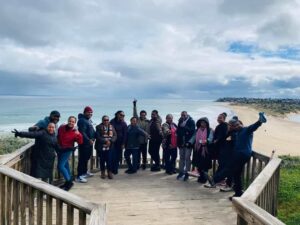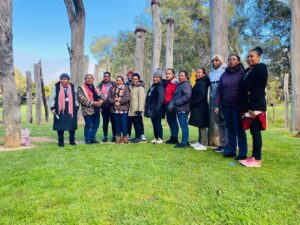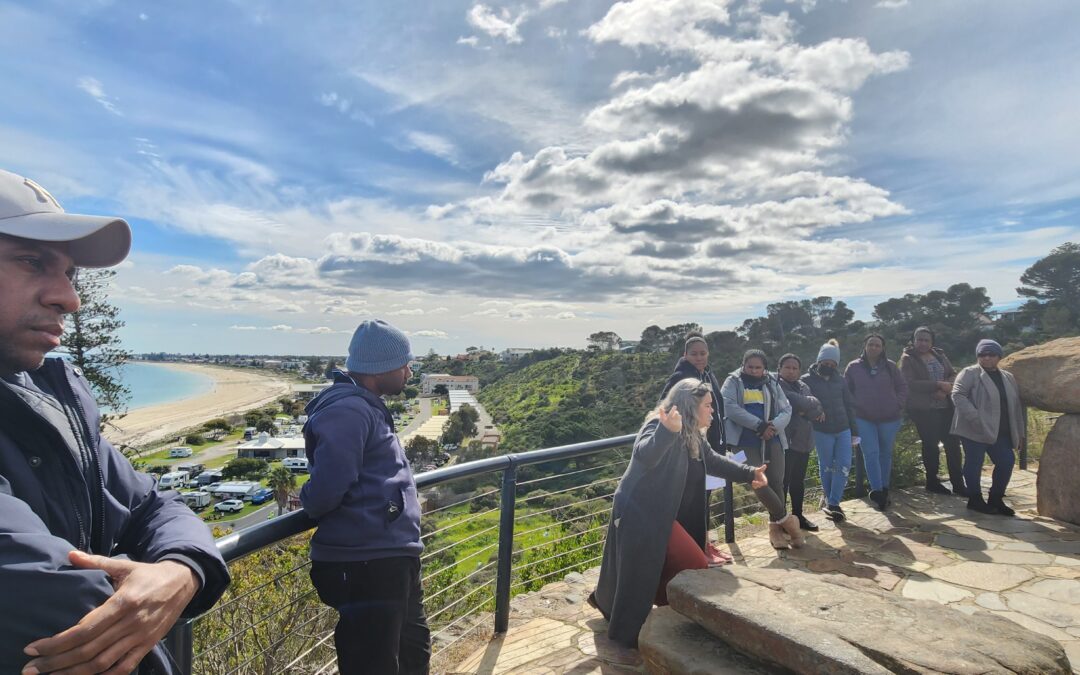Sixteen Australia Awards Papua New Guinean scholars came together in September from across Australia, to deepen their understanding of Australia’s shared history.
Over the four days, scholars gathered on Kaurna and Ngarrindjeri Country, visiting highly significant cultural sites. The scholars connected with the Indigenous peoples and unpacked a shared understanding of cultural values. They engaged in open and honest dialogue about developing pathways to work together for future generations. At night the scholars took part in storytelling, led by Nancy Bates, Aboriginal singer, and story writer.
“What impacted me the most was the similarity in how Papua New Guineans are connected to Country just as Indigenous Australians are. Story telling is an art through which knowledge of the land, the waters and the sea is passed through generations. There is so much we can learn from each other and share experiences for the betterment of both societies,” said Stanley Basave.
Kezziah Paliou shared similar thoughts: “There were so many similarities on a general scale given that we all come from different parts of PNG. It was amazing! We all share a strong connection to our mother land; we only took what we needed for survival; we hunted, traded and fought within our land boundaries and trading routes; we used observance, storytelling and art to pass down to the younger generations our traditions, beliefs and culture.”
Scholars also reflected on how their experience contributed to their study in Australia, and how they can make positive change in Papua New Guinea. Stanley is studying a Master of Public Health and Tropical Medicine at James Cook University. “My participation in this study tour has helped me to understand that for social services to be effective, particularly in health, one needs to ensure that the people are at the centre of the planning process”.
 As an employee of the Department of Lands and Physical Planning, Michealine Aisir’s knowledge will impact policy implementation. “One must incorporate the traditional land tenure systems and understand that western ways are only tools to assist us where it is needed, but not to take over our cultural values, beliefs, and identities. Know the difference, know where to draw the line and not lose yourself as an Indigenous person in and on your own land”. For self-employed Kezziah,who provides online marketing consultancy services for local SMEs and aspires to be an online social entrepreneur, her participation in the tour motivated her greatly, giving her personal conviction that she is on the right path. “I plan to start a non-profit as part of my business’ social corporate responsibility. To do my part in educating my people on the importance of culture and how it is possible to maintain cultural pride and identity in a modern world. This study tour has given me more ideas and helped me gain a clearer vision towards to my goal.”
As an employee of the Department of Lands and Physical Planning, Michealine Aisir’s knowledge will impact policy implementation. “One must incorporate the traditional land tenure systems and understand that western ways are only tools to assist us where it is needed, but not to take over our cultural values, beliefs, and identities. Know the difference, know where to draw the line and not lose yourself as an Indigenous person in and on your own land”. For self-employed Kezziah,who provides online marketing consultancy services for local SMEs and aspires to be an online social entrepreneur, her participation in the tour motivated her greatly, giving her personal conviction that she is on the right path. “I plan to start a non-profit as part of my business’ social corporate responsibility. To do my part in educating my people on the importance of culture and how it is possible to maintain cultural pride and identity in a modern world. This study tour has given me more ideas and helped me gain a clearer vision towards to my goal.”
Marian Muru Wafie is studying a Master of Development Studies at Murdoch University and works to develop policies to address the social needs of marginalised communities. “Culture and values are something we must look into when developing policies. This study has provided me with so many insights and so many questions, which I can use to help Papua New Guinea preserve its cultural identity. I am grateful for this tour, and I have learned a lot for my family, my community, and my country.”
